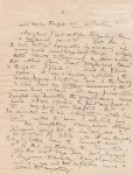260 x 197 mm; eight notepaper leaves, each with writing on one side; twice-folded. Small stain to pages 6 and 7; short horizontal tear at junction of folds on each leaf. Very good condition.
At the time this letter was penned, Roger Casement was a passenger on the SS Armadale Castle, returning to England after a period in South Africa. He had committed money from his life insurance to his brother Tom’s project of buying an inn at Mount Rydal, Witsieshoek, on the border between the Orange Free State and Basutoland, and had been in South Africa in this connection. Casement’s leave from the Foreign Office was due to expire at the end of the month, and we find him, at the time of writing, at a critical juncture in his life, contemplating his future.
Though knighted for his role in exposing atrocities against native peoples in the Congo and Putumayo, Casement, worn out by arthritis, no longer saw himself continuing in colonial service. He would formally request permission to retire on 29 June 1913. His thoughts were very focused on the Irish language and independence for Ireland. The first two pages of the letter express thanks to Mr and Mrs de Villiers for their kindness in having come to see Casement off at Cape Town harbour. Casement explains his failure to visit them at their home, as Alice Stopford Green had urged him to do, mentioning that he had made an attempt, but had mistakenly gone to the home of Lord de Villiers, brother of the letter’s recipient.
The greater part of the letter moves from expressions of sympathy with General Hertzog and his campaign for the Dutch or fledgling Afrikaans language in South Africa, to concerns about British imperialism and its impact on his beloved Ireland and the Irish tongue. As early as 1893, as Séamas Ò Sìocháin notes in Roger Casement: Imperialist, Rebel, Revolutionary, there had been “evidence of a parallelism between [Casement’s] thinking on Africa and on Ireland.” Ò Sìocháin also quotes correspondence with Casement’s cousin Gertrude in which Hertzog is referred to as “the Dutch Parnell”.
Conditions in South Africa serve as a means of crystallising Casement’s thinking on his own country. A startling prescience emerges when he writes: ‘I know quite well what the English mean by “Equal rights”! We’ve had plenty of that kind of talk in Ireland but we’ve never seen the real thing. … I want Ireland to be restored to Europe. I want to see her again a country – a land, a nation, playing her part in European life and always as I believe, playing it just and rightly. I don’t look upon her at all as a bit of English property, or as belonging to England, or as being “owned” by anyone but herself and her own children and I hope before I die to see something start become reality … I only want to be “an Irishman” – to me it is the proudest title upon Earth. … I fully expect to end my days in jail – and there are a good many things I’d cheerfully go to jail for, and one is the poor old downtrodden, despised Irish language.’
Roger Casement, stripped of his knighthood, was hanged on 3 August 1916, after his capture following a secret landing on the coast of Ireland in events leading up to the Easter Rebellion. This letter is a clear testament by one of the outstanding figures in Irish history, at a key moment in the development of his thinking.
- Size: 260 x 197 mm
- Sold By: Christison Rare Books
- Contact Person: Lindsay Christison
- Country: South Africa
- Email: [email protected]
- Telephone: 073 290 2830 / 041 371 4844
- Preferred Payment Methods: EFT, Paypal, Secure card facilities
- Trade Associations: SABDA, IOBA


























